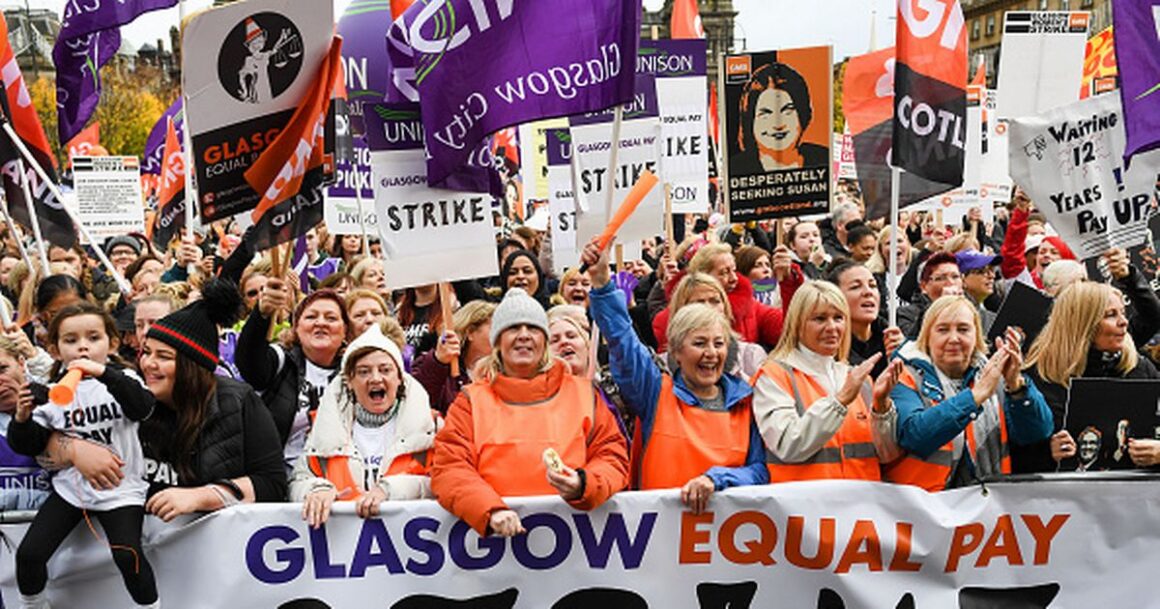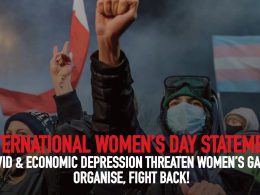By Daisy Crump and Paul Moorhouse, Socialist Alternative in Scotland
Glasgow City Council’s public relations team spent the first week of March flooding social media with posts telling us that ‘The Glasgow Family is once again supporting International Women’s Day (IWD)… the theme of this year’s event is to ‘Break the Bias’ by calling out on gender bias and equality’. No hint crept into this ‘purple washing’ campaign of the growing revolt by Glasgow’s own female workforce about the blatant inequality of their pay at the hands of the SNP-led council. Members of Unison, GMB and Unite had been set to strike on 28 and 29 March in the latest round of the battle against discriminatory pay rates across the council, calling out their own bosses’ blatant gender bias.
Last-minute turnaround by Glasgow City Council
At the last minute, the Council finally agreed to start making payments to workers who have lost out and the strike has been postponed. However, the unions have made it clear that further stoppages, planned in April, will still take place if Council Leader Susan Aitken does not return to meaningful negotiation. The dispute follows victory in a 2017/18 court case which ruled that the council discriminated against women with its payment protection scheme and workforce pay and benefits review. A subsequent investigation demonstrated that many women were earning less than men doing similar work; some by an unbelievable £3 less per hour! The council under both Labour and SNP administrations had dragged their heels through ten years of Tribunal and Court Proceedings, and were only forced to pay up at all by strike action in 2018.
Council failed to settle claim for years
But, after being forced to agree to a historic settlement worth over £500m to cover arrears of pay up to 2018, Glasgow City Council consistently failed to make payments for subsequent years. Councillors and senior management claimed that they cannot do so pending the introduction of an updated pay and grading system, which may not be fully in place until April 2024, six years after ‘settling’ the dispute. The offer which led to postponing the strike is understood to mean that payments will start in October this year.
Unison, the largest city council union, reports that a staggering 25,000 workers have received no compensation whatsoever in the four years since the settlement was originally agreed, including over 5,000 new claims made since 2018. Even worse the council are trying to exclude whole swathes of workers included in the original deal from the updated scheme, such as social care, clerical workers and early years nursery staff (traditionally undervalued ‘womens’ jobs).
Overwhelming result
When the ballot results were announced with an overwhelming 96% of those balloted by Unison and 98% of GMB members voting for strike action, Susan Aitken responded by asking the Unions to ‘show some humility’. These numbers clearly demonstrate the anger felt by workers tired of sexist discrimination against a backdrop of skyrocketing living costs, which disproportionately impact women, despite the ‘protection’ of ‘equal rights legislation’. It was this anger, and the threat that this would bring services to a halt across the council which dragged Aitken to the negotiating table at the last minute, let’s hope her humility lasts!
Aitken’s last-minute turn-around is an important victory for workers in Glasgow and across Scotland. But the equal-pay strikers and their unions are right to remain vigilant. It is also important to widen the struggle: 95% of GMB members across Scotland have voted in an indicative ballot for industrial action against the Confederation of Scottish Local Authorities (COSLA)’s insulting 2% offer in response to the trade union demand for £3,000 across the board. Like the Glasgow victory, this indicates that workers across Scotland want to fight back against austerity, we need to seize that opportunity and teach the Aitkens of the nation the real meaning of humility!











